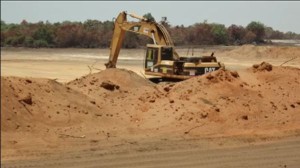A local rights group, the Tavoyan Women’s Union (TWU), releases video it claims shows how Thai and Burmese developers of the Dawei deap-sea mega project are abusing villagers’ rights.
 The video highlights how the pristine beauty of the Tavoyan coast is being destroyed by the massive port and industrial zone that has been in the planning since 2008.
The video highlights how the pristine beauty of the Tavoyan coast is being destroyed by the massive port and industrial zone that has been in the planning since 2008.
After the rainy season 12,000 people from six villagers are to be evicted to make way for the first stage of the project. In total, 30,000 people from 19 villages will have to move from the Nebule area.
In the video, villagers described their feelings of horror at having to be evicted from their land. They have rejected compensation and have blocked surveyors from measuring their land for construction.
Large company construction vehicles, such as heavy trucks, are ruining local roads not built to withstand such use making it harder for locals to travel. The vehicles are also blocking local transport and preventing children from going to school. Whilst this is occurring, new roads for the project are blocking existing waterways, causing flooding and the destruction of rice fields.
“We have asked the company to repair the roads so many times. Every time they have a new excuse to not repair the roads,” one young man, a local villager, says in the video.
Another villager, a young woman, expressed her anger at being forced to move from her home to make way for the project.
“The authorities came to our village and told us how lucky we were to be moving. But they think just for their own benefit,” she said. “What they are doing is wrong,” she added, obviously distraught.
Villagers, frustrated as they claim their pleas are not been heard, are starting to take matters into their own hands.
A woman from Mayingyi village – part of the planned industrial zone – is shown in front of a homemade barricade strung across a new road that goes through her property, where she once grew cashew trees. She says that she was promised compensation for the loss of her cashew trees, but that she has not yet received any compensation.
“They started building this road three years ago,” she said, “they said it was just a small road but it wasn’t. I asked them when I could get compensation… they kept saying they would provide some but never did,” she added.
The video raises concerns about the environmental and social impacts of the massive project, especially pollution from the planned petrochemical industries and power plants. The TWU is calling for an immediate suspension of the project, and for local communities to be granted the right to Free Prior and Informed Consent to any future developments.
“We are not against development,” said Su Su Swe a General Secretary of TWU, “but the Tavoyan people must be allowed to make decisions about our own development and our own natural resources.”
The Dawei project, with major investment from the Italian-Thai Development Public Company, would be part of a special economic zone, forming an industrial estate the size of American Samoa, with sea, land, rail and pipeline links to the Burma’s neighbours. In particular it could connect to Thailand’s eastern seaboard via the Laem Chabang deep-sea port at Chonburi.
By the time construction has finished the Dawei deep-sea port and industrial estate will cover an area of approximately 205 square kilometres (the size of American Samoa), or around 50,675 acres and is up to 10 times larger than comparable industrial estates in eastern Thailand. It is estimated that the Dawei mega project will cost $60 billion.



